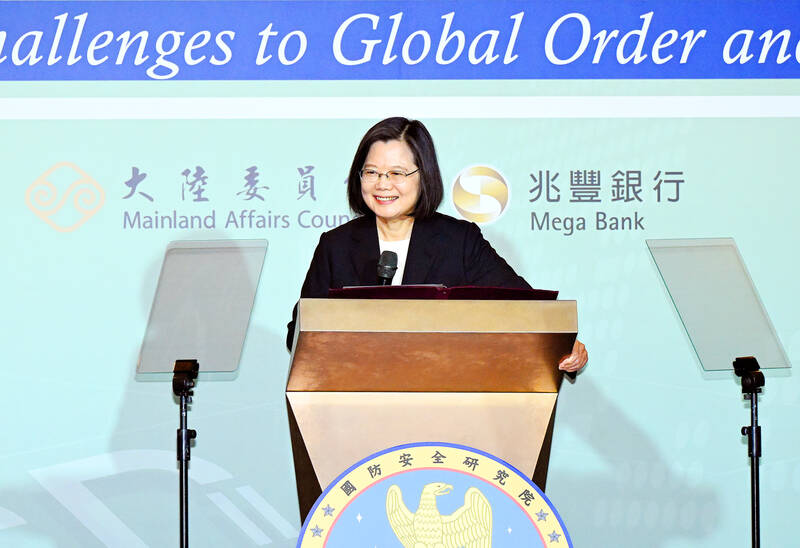The world “cannot take peace for granted” amid mounting challenges to the international order posed by authoritarian states, President Tsai Ing-wen (蔡英文) said in a speech highlighting Taiwan’s efforts to defend itself against China.
Tsai was speaking at the Taipei Security Dialogue hosted by the Institute for National Defense and Security Research in Taipei.
The outbreak of major conflicts and the COVID-19 pandemic have destabilized the global economy and threatened the world order, she said.

Photo: Liao Chen-hui, Taipei Times
Academics from Australia, the Czech Republic, France, Germany, India, Japan, Singapore, Turkey, the UK, the US and elsewhere attended the conference on countering the challenge Beijing poses to the global order and democracies.
Democratic nations must “stand fast in our defense of freedom and democracy” at a time of instability, Tsai said, an apparent reference to the Russian invasion of Ukraine and the Israel-Hamas war.
The most pressing threat to free and democratic nations comes from authoritarian regimes, including Beijing’s “escalating gray-zone activities [that] have created serious instability” in the Indo-Pacific region, she said.
Taiwan is particularly targeted by China’s gray-zone tactics, including “increasingly frequent incursions into our ADIZ [air defense identification zone] and military exercises in our vicinity,” she said.
The nation also faces “economic coercion and persistent cyberattacks,” Tsai said.
“Taken as a whole, these hybrid tactics are designed to deplete Taiwanese people’s confidence in our democracy and to undermine our resolve to defend ourselves,” she said. “The people of Taiwan are determined to protect our own hard-earned freedoms. Our priority therefore is to enhance our self-defense capability and social resilience.”
Taiwan has reinstated one-year compulsory military service, furnished conscripts with more realistic training and reorganized its force structure to meet the challenges of modern warfare, Tsai said, highlighting her administration’s defense policies.
The nation’s defense budget has increased in the past eight years to achieve a year-on-year growth rate of 7.7 percent, she said, adding that Taiwan is on track to spend 2.5 percent of GDP on its military next year.
In September, Taiwan launched a prototype from its indigenous defense submarine program, reaching a milestone in the nation’s domestic naval production program, she said, adding that many had deemed the project to be too ambitious.
“These achievements are a testament to our unwavering resolve to defend our country,” Tsai said.
The nation also has to counter non-conventional threats, including cognitive warfare, which uses misinformation and disinformation to “exploit and drive polarization in free and democratic societies,” she said.
Taiwan’s response is to “equip our people with the knowledge to refute and report ... misleading information to strike a balance to maintaining the free flow of information while denying information manipulation,” Tsai said.
“As a responsible member of the international community, Taiwan will continue working to maintain regional peace and stability while expanding and deepening [collaboration] with other stakeholders,” she said.
“With democracies around the world facing their greatest test in a generation, it is crucial that we come together in deterring adventurism and aggression in the region,” she said, calling for more international support for Taiwan.

INVESTIGATION: The case is the latest instance of a DPP figure being implicated in an espionage network accused of allegedly leaking information to Chinese intelligence Democratic Progressive Party (DPP) member Ho Jen-chieh (何仁傑) was detained and held incommunicado yesterday on suspicion of spying for China during his tenure as assistant to then-minister of foreign affairs Joseph Wu (吳釗燮). The Taipei District Prosecutors’ Office said Ho was implicated during its investigation into alleged spying activities by former Presidential Office consultant Wu Shang-yu (吳尚雨). Prosecutors said there is reason to believe Ho breached the National Security Act (國家安全法) by leaking classified Ministry of Foreign Affairs information to Chinese intelligence. Following interrogation, prosecutors petitioned the Taipei District Court to detain Ho, citing concerns over potential collusion or tampering of evidence. The

‘FORM OF PROTEST’: The German Institute Taipei said it was ‘shocked’ to see Nazi symbolism used in connection with political aims as it condemned the incident Sung Chien-liang (宋建樑), who led efforts to recall Democratic Progressive Party (DPP) Legislator Lee Kun-cheng (李坤城), was released on bail of NT$80,000 yesterday amid an outcry over a Nazi armband he wore to questioning the night before. Sung arrived at the New Taipei City District Prosecutors’ Office for questioning in a recall petition forgery case on Tuesday night wearing a red armband bearing a swastika, carrying a copy of Adolf Hitler’s Mein Kampf and giving a Nazi salute. Sung left the building at 1:15am without the armband and apparently covering the book with a coat. This is a serious international scandal and Chinese

Seventy percent of middle and elementary schools now conduct English classes entirely in English, the Ministry of Education said, as it encourages schools nationwide to adopt this practice Minister of Education (MOE) Cheng Ying-yao (鄭英耀) is scheduled to present a report on the government’s bilingual education policy to the Legislative Yuan’s Education and Culture Committee today. The report would outline strategies aimed at expanding access to education, reducing regional disparities and improving talent cultivation. Implementation of bilingual education policies has varied across local governments, occasionally drawing public criticism. For example, some schools have required teachers of non-English subjects to pass English proficiency

TRADE: The premier pledged safeguards on ‘Made in Taiwan’ labeling, anti-dumping measures and stricter export controls to strengthen its position in trade talks Products labeled “made in Taiwan” must be genuinely made in Taiwan, Premier Cho Jung-tai (卓榮泰) said yesterday, vowing to enforce strict safeguards against “origin laundering” and initiate anti-dumping investigations to prevent China dumping its products in Taiwan. Cho made the remarks in a discussion session with representatives from industries in Kaohsiung. In response to the US government’s recent announcement of “reciprocal” tariffs on its trading partners, President William Lai (賴清德) and Cho last week began a series of consultations with industry leaders nationwide to gather feedback and address concerns. Taiwanese and US officials held a videoconference on Friday evening to discuss the